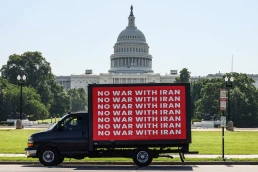By illegally refusing to hold votes on whether or not to halt wars, Speaker Mike Johnson has made himself responsible for those wars and every death, injury, traumatic impact, bit of destruction, degree of global warming, and brutal influence on our culture that stems from those wars.
By David Swanson
It’s a crowded field, I know. Soldiers are proudly publishing videos of their own gruesome crimes. Prime Ministers are touring the world in defiance of arrest warrants. But I want to make sure we’re aware of one prominent member of the list of individuals responsible for the crime of war: U.S. House Speaker Mike Johnson (Republican from the state of total submission to Trump).
War is a crime under numerous laws and treaties, absolutely regardless of who does it. There is no exception for legislatures. But let’s assume that you define all distant murders (such as of Venezuelan boaters) as war, and that you commit to total non-recognition of all the laws against war (and of the U.S. Constitution’s mandate that treaties be the supreme law of the land) — in other words, let’s assume that you are the New York Times. Then you’re left with the problem that the U.S. Constitution allows the Congress and not the Executive to declare wars.

In 1973, the Congress, overriding the veto of the Executive, created a new law called “The War Powers Resolution” which allowed presidents to do what they’d long been doing anyway, namely launch unconstitutional wars, but put time limits and reporting requirements on those wars, and established the means for any single member of either house of the Congress to compel a vote in that house on whether to, in effect, declare:
“Not this time. This particular war, the Congress says no to, as the first branch of the government and the branch in possession of Constitutional war powers. End it immediately, or cease threatening and do not begin it.”
If we were not steadfastly ignoring all treaties, we might note that threatening wars is always a violation of the United Nations Charter. Ignoring treaties or not, the U.S. Congress needs to do something to halt each war/crime. Just as every shipment of weapons to Israel violates numerous U.S. laws and treaties, yet we still require the Congress to pass yet another law before the shipments are stopped, a U.S. war may violate numerous laws and yet roll on unless somebody does something to stop it. So, what can Congress do?
This is where the War Powers Resolution comes in. It is a tool that can be used to, at the very least, compel our so-called “representatives” to vote yes or no on a deeply unpopular and malevolent war that their funders and party leaders expect them to keep rolling on.
Or, rather, the War Powers Resolution used to be such a tool. Now, we have a man running the U.S. House of Representatives who is violating the War Powers Resolution by not holding the votes that it requires. By illegally refusing to hold votes on whether or not to halt wars, Speaker Mike Johnson has made himself responsible for those wars and every death, injury, traumatic impact, bit of destruction, degree of global warming, and brutal influence on our culture that stems from those wars.
For decades, a single Congress Member, or a small number of them — Dennis Kucinich and Ron Paul was a frequent “bipartisan” combination in relatively recent history — could introduce a resolution and force a vote, despite the wishes of the House “leadership” or the president or even the weapons dealers — on whether to end or forestall a particular war. The votes failed, over and over again, but they created pressure against wars, and they identified for ordinary people which Congress Members needed to hear from them. (If someone has a detailed record of all such votes, I wish they’d tell me.)
And then came Yemen. For the first time, a house of Congress — and in fact it was both of them — was not just forced to hold a vote, but saw the vote pass. (When one house passes one of these things, the other house has to vote too.) The bill was sent to President Trump 1.0 requiring an end to U.S. warmaking in Yemen. Trump vetoed, and the Congress failed to override. The Congress then chose not to send the same bill to President Biden at all. But a new threat to the war machine had appeared.
Now there are resolutions in the House that legally require swift votes on Venezuela and on Iran, but no votes are expected, because Mike Johnson doesn’t want them.
Here’s how FCNL’s “War Powers Resolution Activist Guide” accurately describes the law, but not the reality:
“Any member of the House or Senate, regardless of committee assignment, can invoke section 5(c) of the War Powers Resolution and get a full floor vote on whether to require the president to remove U.S. armed forces from hostilities. Under the procedural rules of the War Powers Act, these bills are granted expedited status—requiring a full floor vote in the House within 15 calendar days, and in the Senate within 10 calendar days of introduction. This provision is especially powerful because it allows members of Congress to force timely debates and votes on the president’s use of military force, reinforcing Congress’s constitutional authority over decisions of war and peace.”
(What the law actually says is 15 days for action in a committee plus 3 more days for a vote by the full house.)
But, according to National Review, Johnson has “come out against” holding a legally mandated vote on war on Iran. That publication explains that “Johnson could remove the privileged nature of the resolution and prevent it from getting a vote, according to Politico.” That sounds as though Politico has made some legalistic case for Johnson’s right to violate the law, but you’ll find no such thing at the Politico link, which merely says: “Speaker Mike Johnson could move this week to kill the effort with language getting rid of the privileged nature of the resolution, according to a person granted anonymity to relay the private discussions.” But “language” is not a pass to violate a law.
Congressman Ro Khanna has a statement on why the House should vote on Iran, but it focuses on the substantive reasons to vote and vote yes, noting on the legal requirement of holding the vote merely “It is structured as a privileged resolution, meaning it will receive a vote. Every member of Congress will have to decide whether they stand for diplomacy and the Constitution, or for endless war and executive overreach.” Will they?
According to The Hill, Khanna and Congressman Massie could force a vote regardless of what Johnson wants. Can they? Why haven’t they?
There are other required votes, including on the same war, and on Venezuela, that have also not been happening. The Senate, meanwhile, has held a vote on (and not passed) a resolution to prevent war on Iran. I suppose there’s little risk to the merchants of death for the Senate to comply with the law and hold mandated votes as long as the House does not.
H.Con.Res.38 on Iran has been waiting for a vote since June 17.
H.Con.Res.40 on Iran has been waiting for a vote since June 23.
Does that seem like 18 days to anybody?
Each of these resolutions has an unusually large number of cosponsors for a resolution that only requires one sponsor to compel a vote, possibly because the new reality is one of people demanding that their representatives cosponsor these things, something they have infinite amounts of time to do, since there’s never any vote on them.
Recent Posts
Oman’s Foreign Minister Said US-Iran Deal Was ‘Within Our Reach.’ Then Trump Started Bombing
February 28, 2026
Take Action Now “The Omani FM decided to go public,” suggested one observer, “so that the American people knew that peace was within reach when Trump…
A War With Iran Would Not Be a One-Off Event But a Disastrous Ongoing Rupture
February 26, 2026
Take Action Now If Congress cedes its power to stop a war with Iran, it will fully erode any lingering promise of democratic restraint.By Hanieh…
New Addition to List of Nuclear Near Catastrophes
February 25, 2026
Take Action Now Debris flew for great distances — many times the distance of 270 meters to a nuclear reactor and nuclear storage facility.By David…
Gavin Newsom’s last budget belies his ‘California for All’ pledge
February 24, 2026
Take Action Now Yet, even as the state is poised to lose billions in federal funding, and millions of Californians are losing access to health care…




